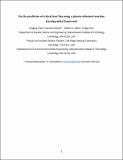On the prediction of critical heat flux using a physics-informed machine learning-aided framework
Author(s)
Zhao, Xingang; Salko, Robert K.; Guo, Fengdi
DownloadSubmitted version (1.514Mb)
Publisher with Creative Commons License
Publisher with Creative Commons License
Creative Commons Attribution
Terms of use
Metadata
Show full item recordAbstract
The critical heat flux (CHF) corresponding to the departure from nucleate boiling (DNB) crisis is essential to the design and safety of a two-phase flow boiling system. Despite the abundance of predictive tools available to the thermal engineering community, the path for an accurate, robust CHF model remains elusive due to lack of consensus on the DNB triggering mechanism. This work aims to apply a physics-informed machine learning (ML)-aided hybrid framework to achieve superior predictive capabilities. Such a hybrid approach takes advantage of existing understanding in the field of interest (i.e., domain knowledge) and uses ML to capture undiscovered information from the mismatch between the actual and domain knowledge-predicted target. A detailed case study is carried out with an extensive DNB-specific CHF database to demonstrate (1) the improved performance of the hybrid approach as compared to traditional domain knowledge-based models, and (2) the hybrid model's superior generalization capabilities over standalone ML methods across a wide range of flow conditions. The hybrid framework could also readily extend its applicability domain and complexity on the fly, showing an elevated level of flexibility and robustness. Based on the case study conclusions, the window-type extrapolation mapping methodology is further proposed to better inform high-cost experimental work.
Date issued
2019-10Department
Massachusetts Institute of Technology. Department of Nuclear Science and Engineering; Massachusetts Institute of Technology. Department of Civil and Environmental EngineeringJournal
Applied Thermal Engineering
Publisher
Elsevier BV
Citation
Zhao, Xingang, et al. “On the Prediction of Critical Heat Flux Using a Physics-Informed Machine Learning-Aided Framework.” Applied Thermal Engineering 164 (January 2020): 14540.
Version: Original manuscript
ISSN
1873-5606